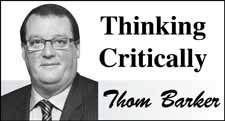I try my very best to base my opinions on careful consideration of the best available evidence, but some things just feel wrong no matter what the evidence suggests.
One such thing is gene patenting. I was incensed Monday when news organizations reported the Children's Hospital of Eastern Ontario (CHEO) in Ottawa is suing the U.S. patent holders of genes related to childhood heart condition Long QT Syndrome (LQTS).
Despite the fact CHEO can easily and cheaply test for the genes, every time they want to screen for the disease, doctors have to send samples to the States at a cost of $4,000.
It boggles my mind how anyone beyond pharmaceutical company executives and their lawyers could even consider that it is somehow okay to patent something that occurs naturally in the human body and then put the potential beneficiaries at risk of death with prohibitive fees.
Shockingly, most of the polls I found were split between about 70-30 and 60-40 against gene patenting. At least a majority believes it is wrong, but I would have thought a much higher percentage would feel in their gut, the way I did, that the whole concept ridiculous.
The Supreme Court of the United States (SCOTUS) was not the least bit split on the issue. This June, in a 9-0 decision, the justices ruled against Utah-based Myriad Genetics who held a patent on naturally occurring mutations in the BRCA1 gene.
"Myriad did not create anything," Justice Clarence Thomas wrote on behalf of his colleagues. "To be sure, it found an important and useful gene, but separating that gene from its surrounding genetic material is not an act of invention."
This case became famous because A-list actor Angelina Jolie announced she had undergone a double mastectomy because the Myriad test for a specific mutation in that gene predicted she was at an abnormally high risk to develop breast cancer.
Fortunately for Jolie, the $3,000 price tag for the test, means very little to someone who pulls down $20 million per movie.
The court did leave the door open for companies to patent new methods of isolating genes, but ruled that did not apply in this case.
"The processes used by Myriad to isolate DNA were well understood by geneticists," Thomas wrote.
Unfortunately, as big news as the SCOTUS decision was, it was a rather modest victory. Some studies estimate that corporations have already claimed most of the human genome with approximately 40,000 patents. Although it could be considered precedent setting, this ruling merely dealt with one patent by one company, it was not a sweeping indictment against all gene patents.
Furthermore, Myriad has won similar challenges in other jurisdictions. In September, the Federal Court of Australia unanimously upheld a decision that allows the patenting of genes in that country saying the act of isolation creates an artificial situation.
"The chemical and physical makeup of the isolated nucleic acid renders it not only artificial but also different from its natural counterpart," the court ruled.
The plaintiffs in that case still have the High Court (the equivalent of our Supreme Court) left as an avenue for appeal, but as it stands right now, Australians do not own their own genes.
I believe there is a legitimate issue here in balancing legitimate intellectual property rights with public access to the benefits of that property.
Not everything, and certainly not the world of medicine, should be driven by profit and profit alone. I don't know how the people in charge of these companies are able to sleep at night.
I rarely see the world in terms of black and white, but when it comes to the patenting of genes, I have to draw a line in the sand. Patents on the building blocks life are simply wrong.
The CHEO lawsuit will be a test case in this country. Let us hope that our courts get it right.



